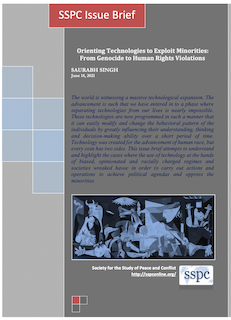Orienting Technologies to Exploit Minorities: From Genocide to Human Rights Violations

The world is witnessing a massive technological expansion. The advancement is such that we have entered into a phase where separating technologies from our lives is nearly impossible. These technologies are now programmed in such a manner that it can easily modify and change the behavioural pattern of individuals by greatly influencing their understanding, thinking and decision-making ability over a short period of time. Technology was created for the advancement of the human race, but every coin has two sides. It was created by humans who have motifs. Biasness, propaganda, and the will to rule are some of the predominant traits embedded in humans. When these motifs entangle with these pre-dominant traits along with the motivation to use technology, the results can be nerve-racking. Throughout history, the use of technology has always been a question of ethics and morality.
Authoritarian regimes and racially biased societies have always used technology in the most insensitive and infernal manner to achieve their objectives, agendas, and narratives in order to attain supremacy. The issue brief tries to understand and highlight the cases where the use of technology at the hands of biased, opinionated and racially charged regimes and societies wreaked havoc in order to carry out actions and operations to achieve political agendas and oppress the minorities. Minorities throughout history have suffered at the hands of those who influence power and manipulate public policies and opinions to entice hate, biases, and discrimination. Aiding such actions with technology can have disturbing implications.
SAURABH SINGH
Saurabh Singh is an alumnus of Symbiosis School of International Studies, Pune where he completed his Masters in International Studies. He is a graduate in English Language and Literature from Christ College, Rajkot. He is a keen learner and policy enthusiast. He has participated in various National and International Conferences. His research interest is mainly focused on the topics - Digital Diplomacy, Cyber Security, Disinformation, Climate Change, Deep Fakes, Artificial Intelligence (A.I.) and Automated Systems. He wants to be a researcher cum lecturer with specialization in Digital Diplomacy focusing on how states and non-states actors’ practice public diplomacy on digital platforms and how it’s complementing and challenging the conventional diplomatic practices. He is also keenly interested in research focusing on technology-driven interventions such as Internet, AI and Automated systems and its varied effects on individuals and their behaviour, climate change, disinformation campaign, international relations and society as a whole.
ACKNOWLEDGEMENT
I would like to thank my family and friends for the support. I would also like to thank Animesh Roul and SSPC for providing a robust platform for presenting my research. This research is an outcome of a brief analysis of how technology is shaping the world around us. If one thinks about it. Technology is ubiquitous. It is some way or the other engaging with us in our day to day life, yet we hardly make a note of it. It’s affecting our behaviour to an extent that it is impossible for us to think of a life without it. Governments around the world are now heavily dependent on Tech and AI for governance and public diplomacy. The amalgamation of Tech and Politics can have some interesting and long-lasting effects throughout the world. It is certainly important to note these conundrums and study them with utmost caution.